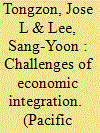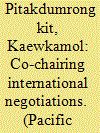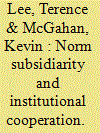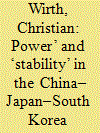|
|
|
Sort Order |
|
|
|
Items / Page
|
|
|
|
|
|
|
| Srl | Item |
| 1 |
ID:
141619


|
|
|
|
|
| Summary/Abstract |
Economic and political changes at the global level have simultaneously shifted Malaysia's interests in the Arab Gulf countries. The economic liberalisation and transformation agenda that emerged in these economies are argued to be contributing factors to Malaysia's interest in expanding its economic relationships with the countries. Although the current cooperation between Malaysia and the Arab Gulf countries is aimed at reaping economic benefits, religious values also constitute an important foundation for these relationships. This article seeks to understand why politics, economics and religion remain the key drivers in determining Malaysia's relations with the Arab Gulf countries. The paper also suggests a future direction for engagement between Malaysia and Gulf Cooperation Council countries.
|
|
|
|
|
|
|
|
|
|
|
|
|
|
|
|
| 2 |
ID:
141620


|
|
|
|
|
| Summary/Abstract |
The Association of Southeast Asian Nations (ASEAN) has agreed to establish an ASEAN single-shipping market (ASSM) by 2015. This paper aims to assess the impediments in achieving this vision and how they can affect the pace of integration. These impediments include the differences in their national shipping capacity, national shipping policies and regulations, and in their quality of shipping-related infrastructure and institutions. Due to these differences, the economic implications are likely to vary and raise important conceptual and implementation issues. The ASEAN experience could contribute to the understanding of shipping market integration and provide some lessons for other countries.
|
|
|
|
|
|
|
|
|
|
|
|
|
|
|
|
| 3 |
ID:
141624


|
|
|
|
|
| Summary/Abstract |
This paper studies the roles of co-chairs in international negotiations. This study attempts to fill the research gap by scrutinizing co-chairs' effectiveness, defined as an ability to shape agreement details in one's direction, to better understand chairs' and co-chairs' influence in negotiations. I argue that a co-chair's effectiveness is not a function of resource possession, but is rooted in its resource management, or ability to convert the existing resources into bargaining influence. To validate my argument, I analyze the Chiang Mai Initiative Multilateralization (CMIM) negotiation rounds from 2005 to 2010, focusing on the members' financial contributions and vote shares.
|
|
|
|
|
|
|
|
|
|
|
|
|
|
|
|
| 4 |
ID:
141621


|
|
|
|
|
| Summary/Abstract |
This paper studies environmental norm contestation in Cambodia's hydropower sector, exemplified by the Kamchay Dam. In Cambodia we can observe different discourses in relation to hydropower. These stem directly from a local contest over the path of Cambodia's development, but use global norms as reference points: one emphasizes environmental protection, using environmental impact assessment (EIA) as point of reference; and one emphasizes the utility of the clean development mechanism (CDM) to attract large-scale investment into the energy sector while downplaying the need for environmental protection. While EIA and CDM are complementary, key actors present them as contradictory. This produces a normative fragmentation of the field of environmental protection. The paper argues that the norm diffusion literature, by presenting norm conflicts as hierarchical local–global conflicts, has paid insufficient attention to the fact that local actors actively draw on global norms to justify domestic development policies. More emphasis on this phenomenon will lead to a better understanding of the role of global norms in domestic politics and will enhance our knowledge of how domestic development policies are contested.
|
|
|
|
|
|
|
|
|
|
|
|
|
|
|
|
| 5 |
ID:
141622


|
|
|
|
|
| Summary/Abstract |
Given competing interests among the three littoral states of Malaysia, Singapore and Indonesia, what explains the nature and timing of their cooperative arrangement in combating maritime piracy in the Straits of Malacca in the post-2004 period? This observation is especially puzzling because the material and strategic interests of these actors generally did not change during the time period that witnessed increased cooperation. We argue that key developments of the anti-piracy regime in the Straits of Malacca cannot be fully explained by rationalist approaches, which traditionally stresses material and national interests of states. By critically engaging constructivist approaches, this paper posits that Malaysia, Singapore and Indonesia engaged in a process of norm subsidiarity. Through norm subsidiarity, relatively weak states get together to develop their own rules to prevent their exclusion or marginalization from institutions of global governance by more powerful actors. The littoral states engaged norm subsidiarity to resist extra-regional attempts to manage piracy in the Straits of Malacca. These extra-regional security proposals triggered a powerful regional cognitive prior, providing the impetus for an indigenous response, leading consequently to a collective cooperative effort to deal with the threat of piracy.
|
|
|
|
|
|
|
|
|
|
|
|
|
|
|
|
| 6 |
ID:
141623


|
|
|
|
|
| Summary/Abstract |
Despite continuing economic liberalization and social integration, relations between Northeast Asian governments are often tense and lead to enhanced military readiness. Alongside confrontation in all three dyads, however, trilateral cooperation between China, Japan and South Korea has been evolving. This study shows that history problems, territorial disputes and geopolitical concerns lock the Chinese, Japanese and South Korean governments into a constellation that creates political space for the emergence of cooperative frameworks. The very fixation on material power and bilateral relationships reveals that power is being exercised in non-material ways in effect foreclosing alternative futures and reproducing existing structures including the pertaining security dilemmas.
|
|
|
|
|
|
|
|
|
|
|
|
|
|
|
|
| 7 |
ID:
141625


|
|
|
|
|
| Summary/Abstract |
This article aims to generate new thinking through application of the concept of trans-border governance to Southeast-Asia within the framework of new regionalism theory in order to fill some gaps in trans-border governance theory. In doing so, it will first elucidate in more detail what actors are involved in trans-border cooperation activities, how their responsibilities, jurisdictions and relative powers can be or have been altered by the interaction and whether trans-border cooperation can be used as a tool for further ‘integration’ or conversely whether it can enhance, as a counter effect, ‘disintegration’. In examining the (economic and political) power relations developed within and between different levels of governments and relevant economic and political stakeholders in ‘growth triangles’, the author aims to clarify the impact of these elements on trans-border governance.
|
|
|
|
|
|
|
|
|
|
|
|
|
|
|
|
|
|
|
|
|